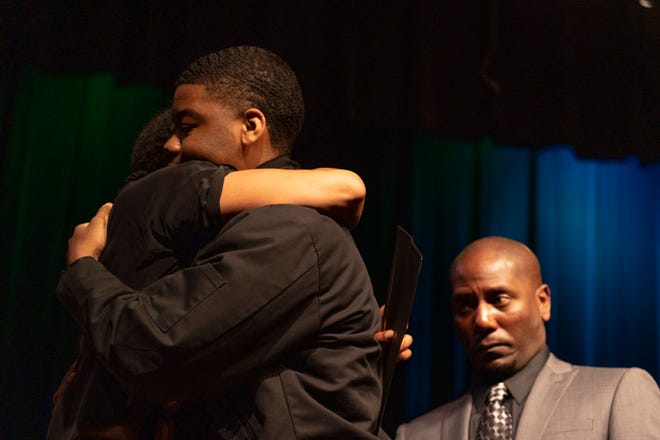Affinity Graduation Cancellations: How Students Preserve Tradition

Table of Contents
The Impact of Cancellations on Students and Communities
Affinity graduations hold immense emotional and cultural significance. These ceremonies aren't just academic celebrations; they're powerful rites of passage, recognizing years of hard work within the context of a specific cultural identity. For Latinx students, for example, it might represent a culmination of family support and the preservation of cultural heritage. For Black students, it could signify overcoming systemic challenges and celebrating resilience within the community. The cancellation of these events leaves a profound void.
The sense of loss and disappointment felt by students when their affinity graduations are cancelled is immense. It represents more than just a missed party; it's a disruption of deeply held traditions and a loss of a shared experience that strengthens community bonds. The impact extends beyond individual students, affecting entire communities who rely on these events to foster a sense of belonging and celebrate their shared heritage.
- Loss of a rite of passage: The cancellation disrupts a crucial transition into adulthood, impacting identity formation.
- Disruption of intergenerational connections: These events often involve family members and community elders, creating a valuable intergenerational link that is broken by cancellation.
- Diminished sense of belonging and community: The shared experience of an affinity graduation is critical for fostering a sense of unity and shared identity within the community.
- Impact on mental health and well-being: The disappointment and disruption can negatively affect students' mental health and well-being.
Creative Alternatives to Traditional Affinity Graduation Ceremonies
Faced with the cancellation of their traditional ceremonies, students have shown remarkable resilience and creativity in finding alternative ways to celebrate their achievements. From virtual celebrations to smaller, intimate gatherings, students are adapting and finding new ways to honor their traditions.
Virtual Celebrations
The rise of video conferencing platforms like Zoom has provided a powerful alternative to in-person ceremonies. Virtual affinity graduations allow students to connect with their communities, regardless of geographical location. While not a perfect replacement for the in-person experience, virtual ceremonies offer several benefits:
- Accessibility for geographically dispersed communities: Students and families who live far apart can still participate.
- Cost-effectiveness compared to in-person events: Virtual events significantly reduce the costs associated with renting venues and catering.
- Potential for technical difficulties and limited engagement: However, challenges such as limited engagement and technical glitches need to be considered.
Small, Intimate Gatherings
Smaller, more intimate gatherings, adhering strictly to safety guidelines, offer a more personal and controlled alternative. These events provide a stronger sense of community in a smaller setting while minimizing the risks associated with larger gatherings.
- Stronger sense of community amongst smaller groups: The reduced size allows for more personal interaction and a deeper sense of connection.
- Reduced risk of COVID-19 spread: Smaller gatherings are significantly safer than large-scale events.
- More personalized celebrations: These settings allow for more individual recognition and personalized speeches.
Postponement and Rescheduling
Postponing ceremonies until a later date, when larger gatherings are deemed safe, is another viable option. However, this option presents logistical challenges:
- Uncertainty regarding future circumstances: The ongoing nature of the pandemic makes predicting future conditions difficult.
- Potential for scheduling conflicts: Rescheduling requires coordinating with many individuals and organizations.
- Maintaining student engagement over time: Keeping students engaged and excited about the event over a longer period requires dedicated effort.
Creating Digital Memory Archives
Building online platforms or archives dedicated to showcasing student achievements offers a lasting legacy for future generations. These digital spaces can preserve memories, accomplishments, and stories, ensuring that the spirit of affinity graduations continues even if physical ceremonies are disrupted.
- Preservation of accomplishments for future generations: A digital archive acts as a valuable historical record.
- Accessibility for wider audiences: Online archives can be accessed by anyone, anywhere in the world.
- Opportunity for ongoing celebration and engagement: These archives can serve as a place for ongoing community engagement and celebration.
The Importance of Preserving Tradition in the Face of Adversity
The responses of students to affinity graduation cancellations highlight their resilience and adaptability in overcoming adversity. Maintaining cultural traditions and heritage is crucial for preserving identity and fostering a sense of community. These celebrations provide a sense of hope and continuity, even in the face of setbacks.
- Strengthening cultural identity: Maintaining these traditions reinforces cultural identity and pride.
- Promoting community cohesion: The shared experience of overcoming challenges strengthens community bonds.
- Providing a sense of hope and continuity: These celebrations offer a sense of normalcy and hope during uncertain times.
Conclusion
While affinity graduation cancellations are undeniably disappointing, they have also revealed the incredible creativity and resilience of students. By embracing virtual celebrations, smaller gatherings, and digital memory archives, students are finding innovative ways to preserve the traditions and values integral to their communities. The ability to adapt and maintain these important celebrations underscores the enduring strength and importance of cultural heritage. Let's continue to support students in their efforts to honor these traditions and find meaningful ways to celebrate their achievements, even in the face of affinity graduation cancellations. Finding creative solutions ensures that these important milestones remain a source of pride and connection for years to come.

Featured Posts
-
 American Music Awards 2025 Janet Jackson Honored With Icon Award
May 27, 2025
American Music Awards 2025 Janet Jackson Honored With Icon Award
May 27, 2025 -
 Stock Market Valuation Concerns Bof As Take
May 27, 2025
Stock Market Valuation Concerns Bof As Take
May 27, 2025 -
 Gucci Re Web Gradient Blue Gg Supreme 838949 Faev 58460 Preview And Release Date
May 27, 2025
Gucci Re Web Gradient Blue Gg Supreme 838949 Faev 58460 Preview And Release Date
May 27, 2025 -
 Taylor Swift Eras Tour Detailed Look At Every Outfit Change
May 27, 2025
Taylor Swift Eras Tour Detailed Look At Every Outfit Change
May 27, 2025 -
 This Weeks Best Queer Anthems Renee Rapp St Vincent And Other Lgbtq Artists
May 27, 2025
This Weeks Best Queer Anthems Renee Rapp St Vincent And Other Lgbtq Artists
May 27, 2025
